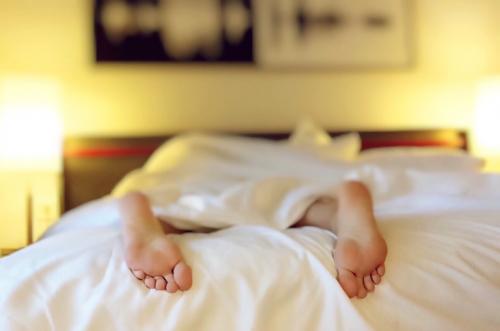 Our days are busier than ever, our to-do lists are packed full, our schedules are bursting at the seams, and 24-hours in a day just isn’t enough to get everything done. When it’s finally time to turn in for the night, we’re more than ready to catch some Zzzzz’s. Since sleep is just as critical to our health as diet and exercise, we found a few tips for getting that much needed good night’s rest.
Our days are busier than ever, our to-do lists are packed full, our schedules are bursting at the seams, and 24-hours in a day just isn’t enough to get everything done. When it’s finally time to turn in for the night, we’re more than ready to catch some Zzzzz’s. Since sleep is just as critical to our health as diet and exercise, we found a few tips for getting that much needed good night’s rest.
Exercise Early
Many times, we squeeze in a work-out when it fits into our schedules. This isn’t always healthy for our sleep cycle though. When we exercise, our body emits a stress hormone, cortisol. Overall, this is a healthy action - unless it’s when we’re ready for bed because the cortisol stimulates our brain activity. If you can, stop your exercise regimen at least three hours before bedtime to ensure you fall asleep faster and sleep more soundly.
Reduce Blue Light Exposure
Reducing blue light exposure 2-hours before bed-time will greatly help your sleep cycle. Blue light comes from electronics like cell phones tablets, laptops, etc. It tricks your body into thinking it’s daytime. This reduces hormone distribution, like melatonin, from radiating through your body, keeping you from relaxing and falling into a deep sleep. If you must use your cell phone, tablet or laptop up until bedtime, it’s encouraged that you download or install apps that block the blue light.
Minimize Food Intake
Late night eating is a no-no as it can interfere with your body’s release of melatonin which will disrupt your natural sleep pattern. Small, light snacks such as air-popped popcorn, a handful or almonds, or a cup of yogurt eaten a few hours before bedtime are okay, but stay away from large, heavy meals. If you’re in a position where a large meal will be consumed right before bedtime, at least cut all the portions in half to help you sleep-cycle stay on track.
Drink Less Fluids
We’ve been told for years that staying hydrated is critical to our health. However, you’ll want to reduce your fluid intake 1-2 hours before bedtime, so you don’t need to excessively urinate during the night. Getting up 2, 3 or more times per night to use the bathroom will affect your sleep quality and daytime energy. There’s nothing worse than being cranky all day because you’re tired and didn’t sleep well.
Don’t lie in bed awake
If you’re lying awake in bed for more than 15-minutes - get up. Whether you realize it or not, you are likely to struggle with the anxiety of NOT being able to tall asleep. Anxious feelings like this can play a factor in developing insomnia. If you can’t fall sleep, don’t just lie in bed, get up and engage in a quiet, non-stimulating activity like reading or listening to music. Once you begin to feel sleepy, return to bed and give it another shot.
At Touchette, we offer clinical sleep testing and study capabilities to patients ages 18 and older in our Sleep Center. Our trained physicians will provide clinical sleep testing, through provider referrals, to uncover any sleep issues you may be having. Our goal is to improvepatients’ quality of life through personal sleep care. To learn more about our Sleep Center, please visit: https://touchette.org/services/sleep-center